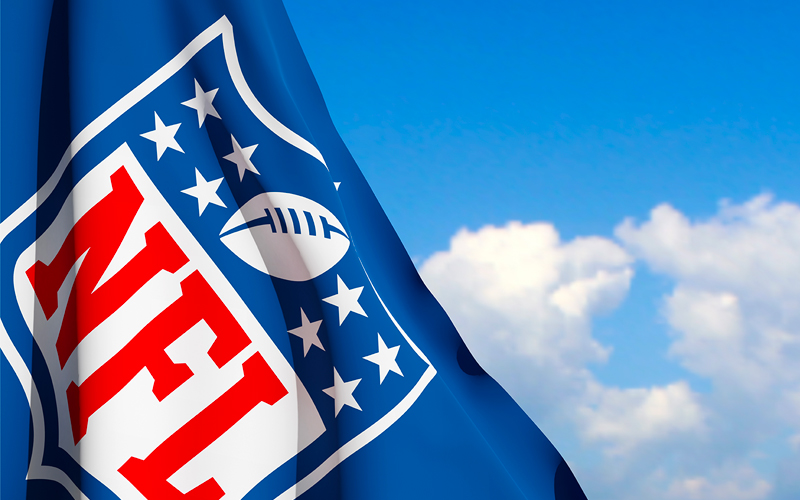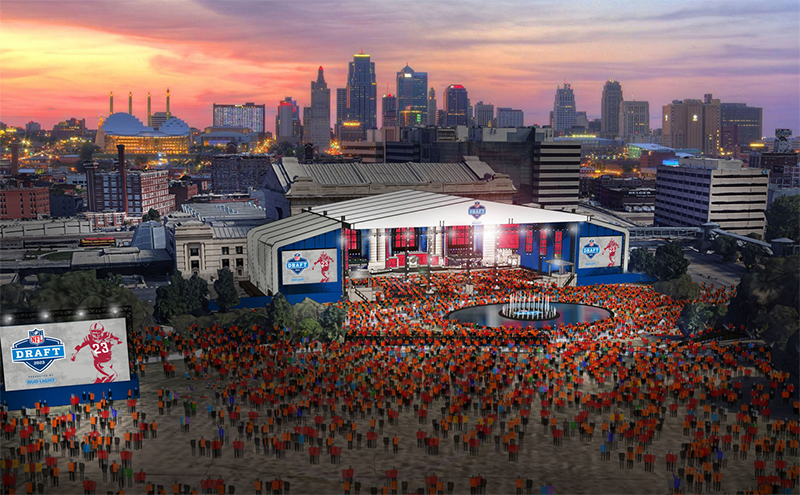
The upcoming NFL Draft in Kansas City is likely the world’s biggest business meeting.
At its core, the draft is a caucus of 32 mega-million-dollar organizations gathering remotely on April 27-29 to pick their next generation of on-field employees.
Hundreds, maybe thousands of media companies, bloggers, vloggers, podcasters, and TikTok’ers will broadcast and stream the event out to millions of viewers and listeners around the world.
And for all three days of the draft, all those eyes will be focused on KC.
Meanwhile, live at Union Station, the crowd will be just as impressive. Think Chiefs Super Bowl victory parade-impressive. “We’re expecting—conservatively—300,000,” says Kathy Nelson, CEO of VisitKC and the Kansas City Sports Commission.
That may be a real understatement. In 2019, when the draft was hosted by Nashville, home of the Tennessee Titans, approximately 600,000 attended, creating an economic impact of about $130 million.
So, yeah, this is kind of a big deal.
For much of its history, the NFL draft, the annual convention of pro football teams picking incoming amateur players, was held in New York City. Far from the spectacle it has become, the first draft was held in 1936 in a Philadelphia hotel. As the event grew in popularity, it moved to larger venues in New York before the League eventually decided to try it out on the road. Chicago hosted it for two years. Dallas, Philadelphia, Las Vegas, and Nashville all have hosted it.
In 2019, Kansas City was chosen to host this year’s event.
Ironically, the 2015 Royals’ World Series parade may have helped land the NFL draft, specifically that photo of Union Station and the surrounding area covered in a sea of blue. “When people really dig in and see that those are people, that’s a game changer for us,” Nelson says. “That picture from that day in 2015 has been worth millions of dollars of economic impact to Kansas City.”
Kansas City started pitching for the NFL Draft in 2015. The group had to convince the draft committee that KC had the transportation, hotels, and the people to support it.
“It was bizarre,” Nelson says. “When we were in New York pitching, of the group of 27 from the NFL who were there when we went to pitch, only three of them had been to Kansas City. So, one of the sticking points was proving our city was capable and wanted to host it.”
Once the NFL visited what they called our “robust” city, they could envision the draft here. Chiefs Kingdom. The streetcars. Power & Light. T-Mobile Center. Union Station. And the people. Not just the ones who sell out Arrowhead Stadium, attend the Big 12 Tournament, or fill up Power & Light during soccer games. Everybody.
Nelson says one committee member said she grew up on the East Coast, lived in New York, and she’d never worn a shirt that had a New York logo on it.
“‘In Kansas City, all of you live here and you wear it on your clothes,’” the woman said, according to Nelson. “She was just blown away by the pride in our city.”

Now that we’re weeks away from this dream becoming reality, there’s still plenty of work to do. Most of April will be spent building the stage where NFL Commissioner Roger Goodell (or a team representative) will announce each team’s draft picks. The NFL is using some local contractors to do the job. The stage itself won’t be complete until a couple of days before the draft.
The “green room,” where prospects and their families will wait anxiously for their names to be called, will be inside Union Station, which will be closed to the public. The players will enter the stage much like the Chiefs and the Royals did during their championship celebrations.
The NFL’s 32 teams’ draft rooms will not be on-site—they’ll all be back in their respective cities (including the Chiefs, who will draft from Arrowhead). The Chiefs, by the way, should be busy on draft weekend. They have 12 picks for the seven rounds of the draft.
Everything (sans concessions, souvenirs, etc.) is free, including admission. There are no physical tickets; the NFL wants fans to register at nfl.com/draftaccess and also download the NFL OnePass app to their phones.
Fans from all teams are expected to converge on the city, where they will watch from the north lawn of the World War I Museum and Memorial and hope their guys pick the right guys.
On the south side of the WWI Memorial, fans will find the NFL Draft Experience, a traveling football theme park. They’ll be able to kick a field goal or test their speed against a simulated player of their choosing, among other activities. The app will include schedules of events, including which players or NFL legends might be making an appearance on the autograph stage each day.
New this year and unique to Kansas City will be a food exhibition area featuring the barbecue and cuisine culture of Kansas City.
And each night after the draft, the NFL will be hosting concerts by national acts, the names of which have not yet been revealed.
If it sounds like a lot, it is.
Nelson says one thing that surprised her about the NFL Draft was all the layers involved, from green initiatives to after parties.
“We have to talk about transportation, we have to talk about media credentials,” she says. “Then there’s the legends and the alumni and how you handle them. It’s been overwhelming, but it’s such an honor to plan this. I think this will be bigger than anyone really appreciates yet.”
The estimated economic impact of the draft is in the tens of millions of dollars (again, conservatively). Of course, everything depends on the weather. Even the prospect of rain isn’t dampening anyone’s hopes for a big turnout.
“We know that football fans are pretty hearty,” she says. “The Chiefs parade in 2020 when it was 14 degrees and sleeting and we had plenty of people here. And then this year when it was somewhat sunny and 40 we still had a lot of people.”
There are, however, several weather preparedness plans being worked on in case the draft show has to take place inside of Union Station.
What’s impressive is how a conglomeration of seemingly unrelated events and improvements have coalesced to make this possible. The NFL Draft in Kansas City ten years ago? No way. Five years ago? Maybe.
The streetcar is a game changer, Nelson says. The transportation system has improved with free busing. The victory parades have helped the city learn what works and what doesn’t. The new airport doesn’t hurt.
“And I think our community is getting smarter about these types of events,” she says. “You saw from the Chiefs parade, Kansas City is learning how to park, how to get downtown for these events, where to show up, when to show up. I think that makes us better as well. I do think we could have hosted this a few years ago, but I think we’re smarter about it now.”


